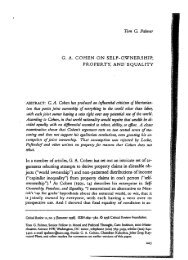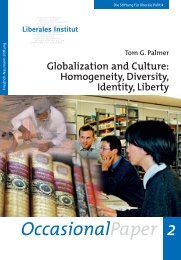Are Patents and Copyrights Morally Justified? - Tom G. Palmer
Are Patents and Copyrights Morally Justified? - Tom G. Palmer
Are Patents and Copyrights Morally Justified? - Tom G. Palmer
You also want an ePaper? Increase the reach of your titles
YUMPU automatically turns print PDFs into web optimized ePapers that Google loves.
INO. ~J <strong>Are</strong> <strong>Patents</strong> <strong>and</strong> <strong>Copyrights</strong> <strong>Morally</strong> <strong>Justified</strong>? 829<br />
a thing has been thought of by one, does not prevent the<br />
same ideas presenting themselves to the mind of another<br />
<strong>and</strong> should not prevent him from a perfect liberty of acting<br />
upon them. 45<br />
Leggett’s argument, while containing strong consequentialist<br />
elements, rests on the intimate relationship between liberty<br />
<strong>and</strong> property:<br />
The rights of corporeal property may be asserted, without<br />
the possibility of infringing any other individual’s rights.<br />
Those of incorporeal property may obviously give rise to<br />
conflicting claims, all equally well founded. . . . [I]f you assert<br />
an exclusive right to a particular idea, you cannot be<br />
sure that the very same idea did not at the same moment<br />
enter some other mind. 46<br />
Israel Kirzner’s attempt to substitute “ownership-by-creation”<br />
for “ownership-by-just-acquisition-from-nature” encounters<br />
difficulty because it leaves us with a mere assumption,<br />
that “a man deserves what he has produced,” as a justification<br />
for property. However, entrepreneurial profits can be justified<br />
in other ways consistent with the theory of ownership-by-justacquisition.<br />
47 “Profits” are justified if they arise by means of<br />
Nozickian “justice-preserving transformations.” 48 A rearrangement<br />
of property titles that emerged through a series of voluntary<br />
transfers, each of which was just, <strong>and</strong> which began on a<br />
foundation ofjust property titles, is itselfjust. If in the process<br />
profits or losses are generated, then these arejust as well. The<br />
Kirznerian substitute, in contrast, suffers from a lack ofgrounding.<br />
“Because we produced it” is an inadequate answer to the<br />
question of why we deserve what we have produced.<br />
These authors do not effectively deal with the important<br />
problem of simultaneous invention or discovery, which is often<br />
raised as an objection to positions such as those taken by<br />
Spooner <strong>and</strong> R<strong>and</strong>. According to R<strong>and</strong>:<br />
As an objection to the patent laws, some people cite the fact<br />
that two inventors may work independently for years on the<br />
45. Id. at 399.<br />
46. Id. at 999-400.<br />
47. See Barnett, A Consent Theo~yof Contract, 86 COLUM. L. REV. 269 (1986). The arrangements<br />
of property that result from transference ofjustly acquired property titles<br />
are themselvesjust, <strong>and</strong> if some arrangements mean profits for some <strong>and</strong> losses for<br />
others, the justice of the profits or losses is ancillary to thejustice of the resulting<br />
arrangement of property titles.<br />
48. K. NoziCic, Supra note 37, at 151.











